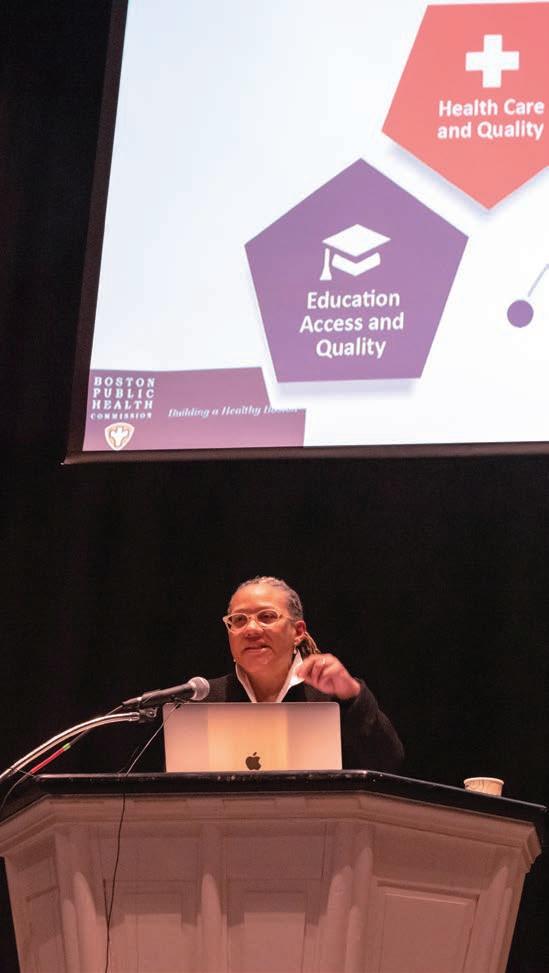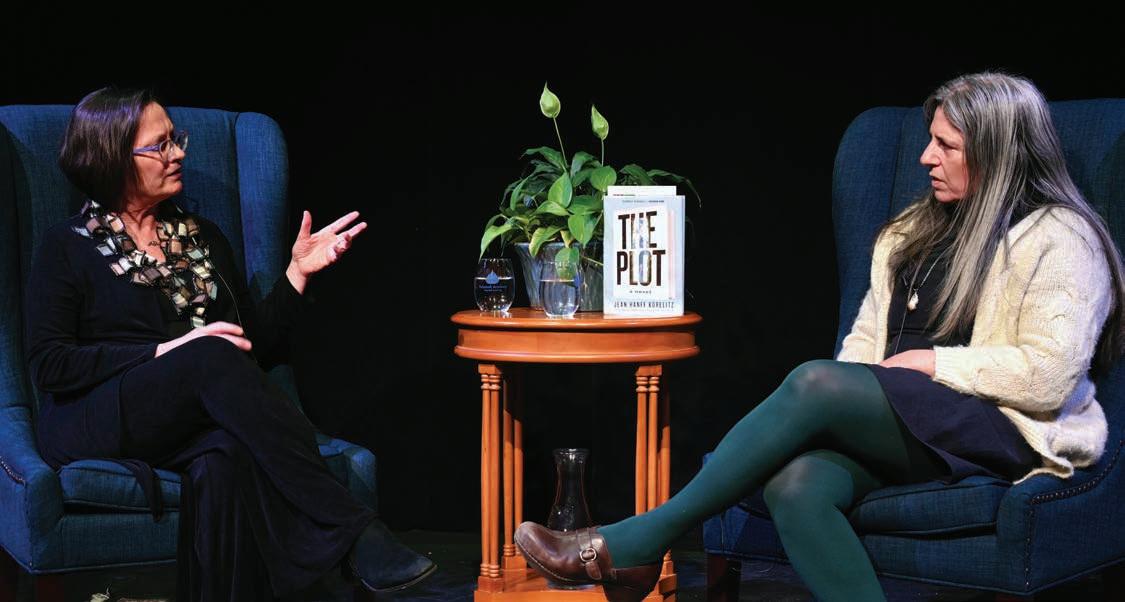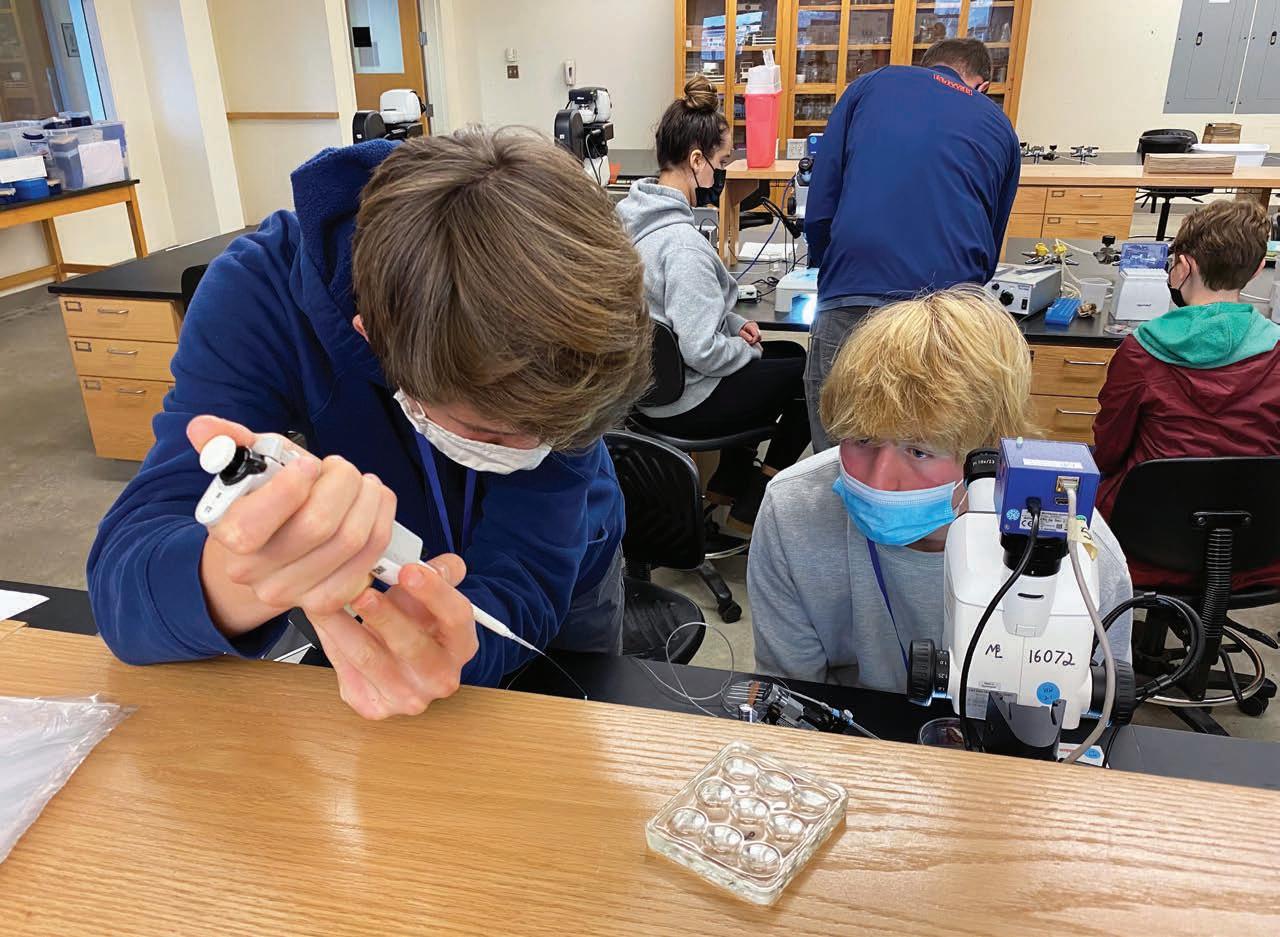
12 minute read
Classroom & Beyond
CRISPR Gene Editing at the MBL
Eight Falmouth Academy students participated in the Marine Biological Laboratory’s CRISPR/Cas9 Gene Editing of Aquatic and Marine Organisms course, an immersive four-day residential hands-on research and learning experience that's part of the lab’s High School Discovery program. Falmouth Academy’s own Dr. Alison Ament was involved in the initial planning of the program, which was launched in 2019 with the goal of making high-level science available to high school students. MBL Director and University of Chicago professor Dr. Nipam Patel and MBL manager of Marine Research Services and Secondary Education Scott Bennett taught the course. Students worked in Patel’s lab with his research team, learned microscopy techniques, manipulated zebrafish genes using cutting-edge CRISPR technology, and participated in roundtables on CRISPR, embryology, bioethics, and careers in science. They also visited the MBL’s Rare Books Library, toured research labs, and visited the MBL’s Marine Resources Center, which houses everything from coral and anemones to horseshoe crabs, cephalopods, fish, and sharks. “I really loved visiting the Center and seeing the axolotls, which are nearly extinct,” said Roberto Marzot ’23. Axolotls are a species of salamander native to Mexico, and MBL has over fifty in different tanks. Researchers are studying their astonishing regenerative capabilities.
CRISPR is an acronym for “clustered regularly interspaced short palindromic repeats.” In simpler terms, CRISPR refers to short repeating sequences of DNA that can be recognized by a guide RNA molecule and cut by an enzyme such as Cas9. This cutting allows researchers to disable a gene (called a “knockout”) and to insert gene sequences in new places in a DNA sequence/ chromosome. There is great potential for treating genetic diseases and disorders with CRISPR by disabling a defective gene or inserting a corrected copy of a gene. It is already being used in experimental trials to treat sickle-cell anemia.
CRISPR’s potential as a gene-editing tool was first observed and described by a researcher working for a yogurt company in France in 2007. Jennifer Doudna and Emmanuelle Charpentier were subsequently awarded the 2020 Nobel Prize in Chemistry for their discovery and pioneering work with the CRISPR/Cas9 “genetic scissors.”
In 10th-grade biology, Falmouth Academy students learn how to micropipette and genetically transform bacteria using restriction enzymes. They also learn the basics of genetics
Above: Ben Gulmann ’23 and Roberto Marzot ’23
and microscopy and discuss the ethics surrounding genetic engineering including the use of CRISPR. “For many students, this is an intriguing and timely subject,” said Falmouth Academy Biology Teacher Sharon Kreamer, who organized and chaperoned the experience. Students self-selected to attend and some scholarship money was made available thanks to a generous donor.
During the MBL course, students edited developmental genes in zebrafish embryos using a CRISPR/Cas9 construct. Through this process, they also learned about embryogenesis and organ formation, and their connection to understanding human health and birth defects. They were able to see the results of the editing using modern methods in microscopy and the 3D imaging software, Fiji.
“Injecting the embryos was difficult at first,” said Michael Zitomer ’22, “but rewarding when done correctly.” Kreamer noted that although there was a learning curve with the new technology, Falmouth Academy students were enthusiastic and capable due to a strong conceptual and practical foundation. “You could see the learning in real-time,” said Kreamer. “As their teacher, it was about witnessing the wonder and excitement of scientific discovery and endeavor in my students.”
Gene editing has great potential, but as Sophia Venetis ’22 noted, there are many things to consider, especially before involving human subjects, including consent, safety, access, and feasibility. “Understanding bioethical implications is essential when pushing boundaries in biotechnology and biomedical research,” said Venetis, “something that I hope to do in my future.”
This program expanded the students’ understanding of science as team-based and collaborative, which gave them a broader picture of what a career in science or research could look like, said Kreamer. “They don’t have to be computer technologists or mathematicians to pursue science.” Zitomer, who plans to study psychology and biochemistry in college, said the program exceeded his expectations, referring to it as a highlight of his high school career.
Participating students included: Sophia Venetis ’22, Michael Zitomer ’22, Ben Gulmann ’23, Daisy Kinsley Hancock ’23, Roberto Marzot ’23, Charlotte Ray ’23, Mateo Vazquez ’23, and Sean Yin ’23
Below (left to right): Tianxiang (Sean) Yin ’23, Mike Zitomer ’22, Roberto Marzot ’23, Charlotte Ray ’23, Mateo Vazquez ’23, and Scott Bennett, Manager, Marine Research Services & Secondary Education
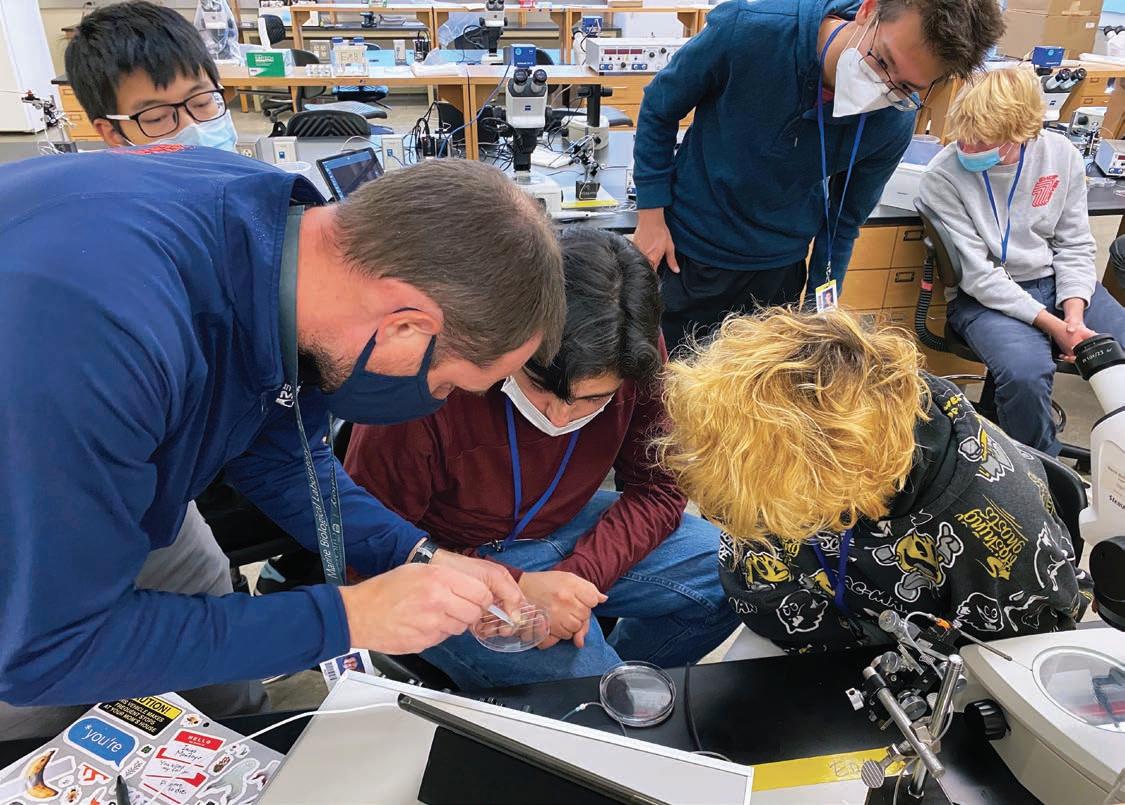
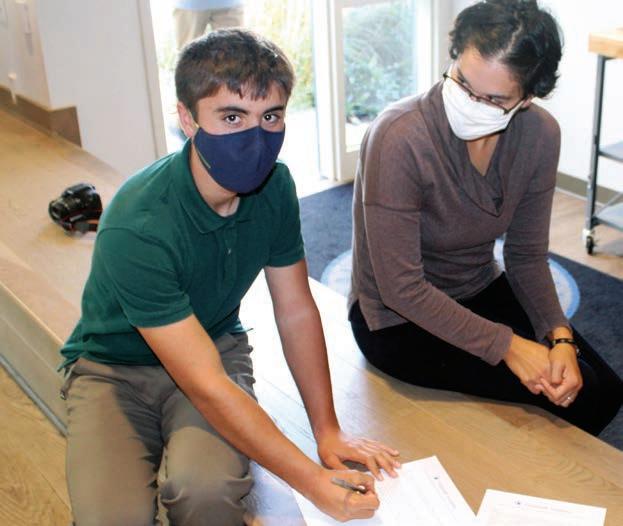
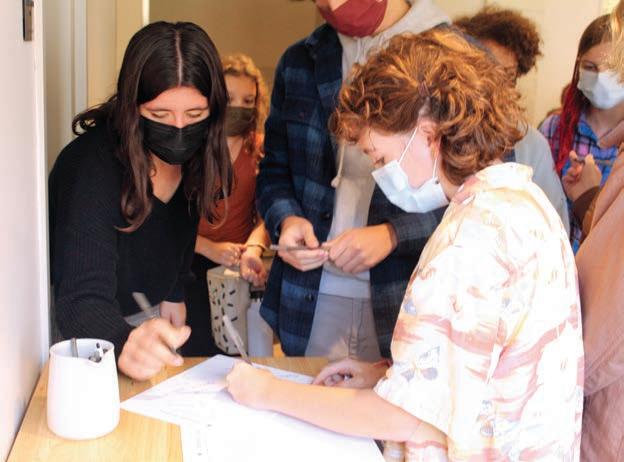
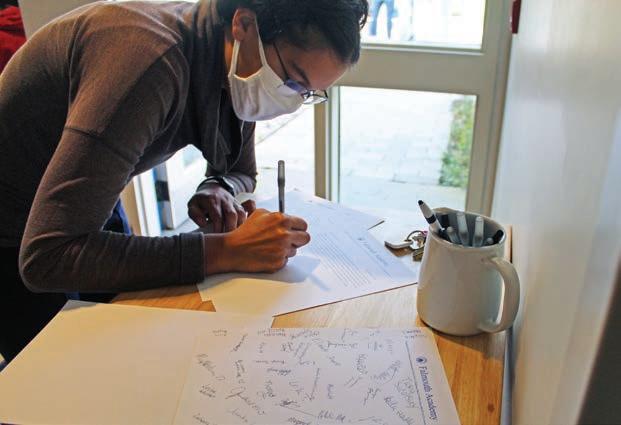
Toward a Better Climate Future
In mid-October, Liz Beardsley P’27 emailed Science Department Chair Liz Klein to let her know that she would be attending the COP26 Climate Change Conference in Glasgow, Scotland, as part of her work with the U.S. Green Building Council. She was interested in the work Falmouth Academy was doing on climate change education and offered to connect students with the U.S. delegation. Together Beardsley and Klein decided to extend an invitation to Falmouth Academy students to compose a letter to the delegation expressing their concerns about climate change. “I wanted this to be open to the entire school community rather than just students participating in the Changing Earth 9th-grade course,” said Klein.
Klein announced the opportunity at All School Meeting, and Adele Francis ’24, Clara Athearn ’24, Benjamin Angell ’24, Amelia Russell-Schaffer ’26, and Eva Muldoon ’25 volunteered to take the lead in composing the letter. They strongly advocated for an urgent response to the climate crisis. “This problem that my generation will likely inherit is so much bigger than the economy, single countries, or even humans,” said Angell. “It is a problem that affects everyone and everything.”
Klein and English teacher Monica Hough helped the students draft the statement, which read:
Students from Falmouth Academy, a small independent high school on Cape Cod, are worried about climate change. They view the situation as a crisis, and their desire to work toward a better climate future is evident in their daily actions. While they can make changes in their lives and the lives of their families, they are counting on world leaders like you to stand up and take significant action to combat global climate change. Talk is just that: talk. We need action. Their future depends on you and those you will be working with at COP26.
Below appear statements that they have written in response to this situation; we have also collected student signatures. We hope that when you read their words, you will commit to the positive changes they deserve.
Sincerely, The Falmouth Academy Community
The final draft was presented to the whole school so that students and teachers could add their signatures. Beardsley delivered the letter containing more than 100 signatures to a representative of U.S. Special Presidential Envoy for Climate John Kerry.
Top: Benjamin Angell ’24 and Liz Klein Center: Tasha Sudofsky ’22, and Penelope Thornton ’27 Bottom: Liz Klein signs the letter written to the COP26 U.S. delegation
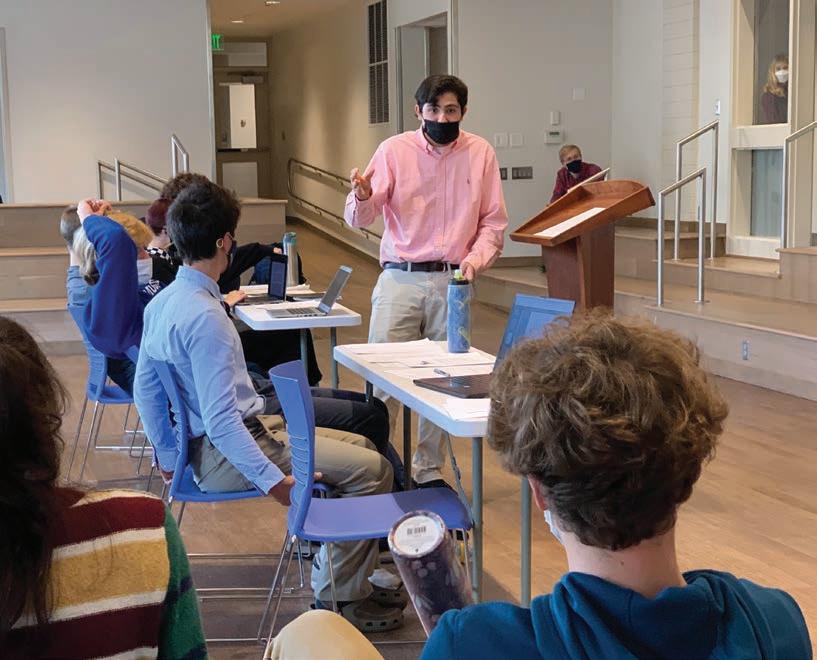
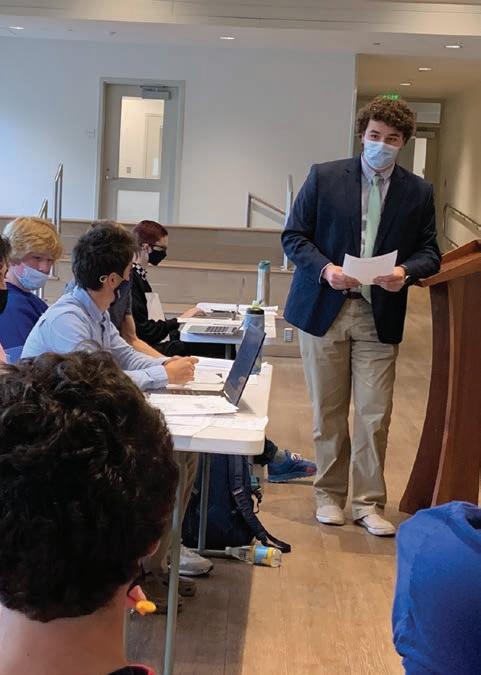
Judge Matt Green Presides at Mock Trial
In the fall, high school students in Matt Green’s newly offered Mock Trial elective enacted The Commonwealth of Pennsylvania v. Taylor Edsel, a trial used by the State Bar as a case study for law students.
“Mock Trial is experiential education at its finest,” said Green. He went on to explain that each year, the Pennsylvania Bar Association designs a case based on actual events, and over the course of three months, participating teams study its intricacies in preparation for a series of trials at which they could be assigned either the role of plaintiff or defendant. Green decided to use a scaled-down version of this to shape his own elective, and the students prepared for two mock trials over the course of this year.
Students were coached on the mechanics of a trial in the fall, and then carefully read the brief before adopting roles and serving as attorneys for both the prosecution and the defense, witnesses, and jurors. The “trial” took place in Morse Hall with Mr. Green posing as the judge with various members of the community, teachers and students alike, volunteering to fill out the jury.
In Pennsylvania v. Edsel, the defendant was accused of arson in the first degree. Prosecutors presented evidence of a history of arson going back to childhood and the defense made a plea for leniency, citing parental abandonment and neglect. They attempted to show that arson was some kind of misappropriated coping mechanism, but failed to convince the jury.
“I enjoyed being a member of the defense team even though the evidence clearly pointed to the defendant's guilt,” said Ben Giumetti ’23. “We were forced to think more in-depth, and look for holes in the prosecution's case and for possible explanations for shady events.”
Mateo Vazquez ’23, who played opposing counsel for the prosecution, was impressed with how seriously his classmates prepared for their roles. He said, “We all really got into the case materials.”
In the spring, students turned their attention to the fictitious Kalmia University, where Harper Marmalard was on trial for first-degree murder stemming from his involvement in a hazing incident that led to the untimely death of Zeta Iota Pi pledge, Mandy Pepperidge.
Clockwise from top left: Ben Giumetti ’23, Mateo Vazquez ’23, and Matt Green
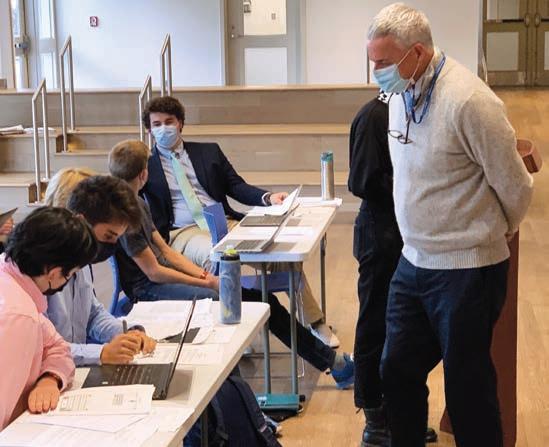
M-U-N is more than just F-U-N
This year brought not only a new venue but a new moderator to Falmouth Academy’s Model UN. Matt Barnes, history teacher and advisor to FA’s Students for Social Justice, took over from retired history teacher, Don Swanbeck. Determined to have an in-person experience, the team had to scramble in mid-January to find an alternative when their planned destination, Dartmouth College's DartMUN, opted to go virtual.
Within a week, the team was registered for a one-day conference in early April held at Worcester State University, which would still give them a small taste of college life (a favorite perk from the traditional three-day Dartmouth College experience) and provide a solid introduction to Model UN. They had to pivot quickly as the new conference came with a whole new set of priorities and topics.
Some say that Model UN can be learned during a conference, but Barnes did not want to rely on a baptism-by-fire approach, figuring that the more they put into it, the more they’d get out of it. The team met after-school and powered through lunches to prepare position papers, draft opening speeches, and research their assigned topics and countries.
Since most had not been to a conference before due in part to the hiatus imposed by the pandemic, Barnes helped his students understand what a simulation entailed as well as brush up on their public speaking and diplomacy skills so that they could compete with confidence. “Students will move on from Model UN to pursue other interests, but what they learn—negotiating, public speaking, and problem solving—are life skills that will benefit them wherever they are,” said Barnes.
The Falmouth Academy contingency represented Algeria, Rwanda, Haiti, Tanzania, Uganda, the United Kingdom, and the United States. Working solo or in pairs, they researched and presented on one of the following two topics, Inequalities Heightened by Covid-19 and Prevention of Animal Trafficking and Assuring Conservation.
Juggling basketball and assistant directing the middle school play, Adele Francis ’24 attended as many prep sessions as possible. She teamed up with classmate Benjamin Angell ’24 and together they played to their strengths with Adele public speaking and Angell doing most of the writing, while both researched inequalities exacerbated by Covid-19. They took a novel and modern approach to finding a solution. Garnering inspiration from kickstarter-type funding platforms, they proposed for agencies and government organizations to pitch their ideas for a slice of the £14.5 billion U.K. foreign aid budget, thus crowdsourcing the solutions to people closer to the problem.
Their ingenuity and diligence paid off. Ben Angell ’24 and Adele Francis ’24 brought home Best Negotiator Awards and teammates, Mateo Vazquez ’23 and Roberto Marzot ’23, part of the United States delegation, fetched Best Position Paper Awards.
When reflecting back on the conference Francis had this to say, “Being taken seriously in such an adult setting, while making decisions to solve real-world problems was empowering and energizing.” She enthusiastically volunteered that she plans to participate again next year.
Left: Abby Neubert ’22 and Fiona Gully ’24 Top right: (back row) Ben Gulmann ’23, Spencer Goldsmith ’22, Ben Giumetti ’23, Ned Heywood ’23, Zach Crampton ’22, Roberto Marzot ’23, Mateo Vazquez ’23, (middle row) Benjamin Angell ’24, Fiona Gully ’24, Tasha Sudofsky ’22, Tianxing (Luke) Xiang ’23, Declan Lane ’25, (front row) Adele Francis ’23 and Abby Neubert ’22 Bottom right: (left to right) Ben Gulmann ’23, Tianxing (Luke) Xiang ’23, and Declan Lane ’25
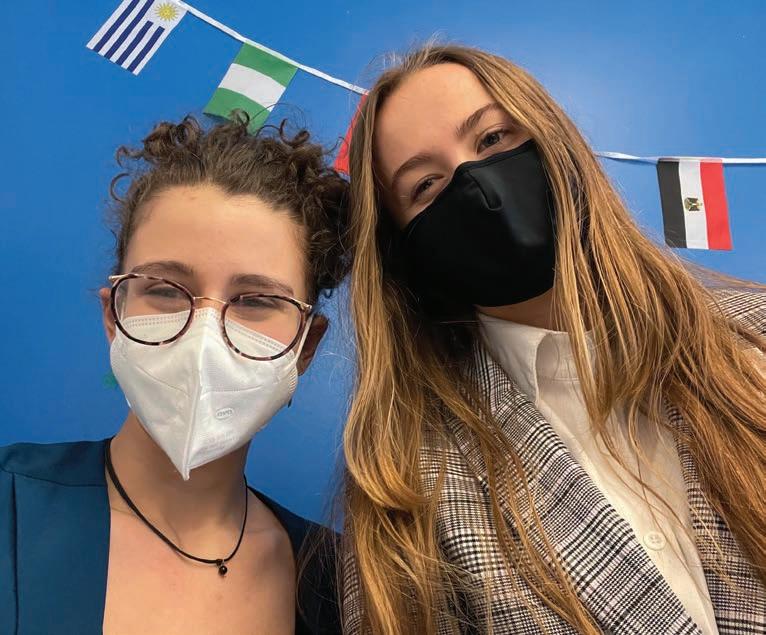
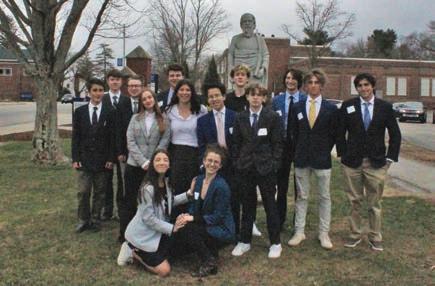
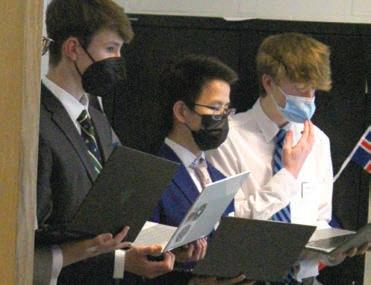
Nature, News, Twin Pandemics, and a Writer’s Life
Falmouth Academy’s 2021–22 Community Series, sponsored in part by the Woods Hole Foundation, returned in person on November 2, 2021 with Cape Cod Naturalist Robert Finch, acclaimed author and NPR radio host of “A Cape Cod Notebook,” who delighted a packed house with charming anecdotes and more serious reflections on what he’s observed about life on the shoreline of Cape Cod over the last fifty years.
February ushered in not one but two events: the first a behind the scenes look at CAI, the Cape’s local NPR station, with Executive Producer and Host of “The Point” and Managing Director of Editorial Mindy Todd, Managing Editor for News Steve Junker, and Production Director and Host Dan Tritle. At the end of the month, Deputy Executive Director Dr. Kathryn Hall of the Boston Public Health Commission engaged the audience in a look at the strained alchemy between twin pandemics, health inequity and Covid-19. She presented as part of the Wood Hole Black History Month Series.
The series wrapped up in early April with an entertaining interview with NY Times Bestselling-Author Jean Hanff Korelitz conducted by English Teacher Monica Hough. The two women chatted like old friends about the writing process, Korelitz’s prolific career, and her latest book, The Latecomer, which was published on May 31, 2022.
Recordings of the events are available on the Falmouth Academy website on the Community page.
Top: Dr. Kathryn Hall addresses health inequities and Covid-19 Bottom: Monica Hough interviews Jean Hanff Korelitz
